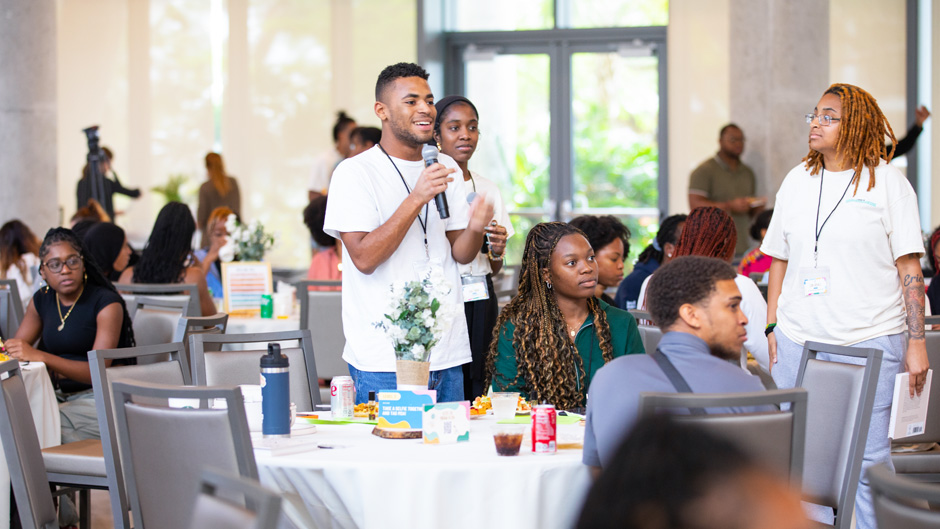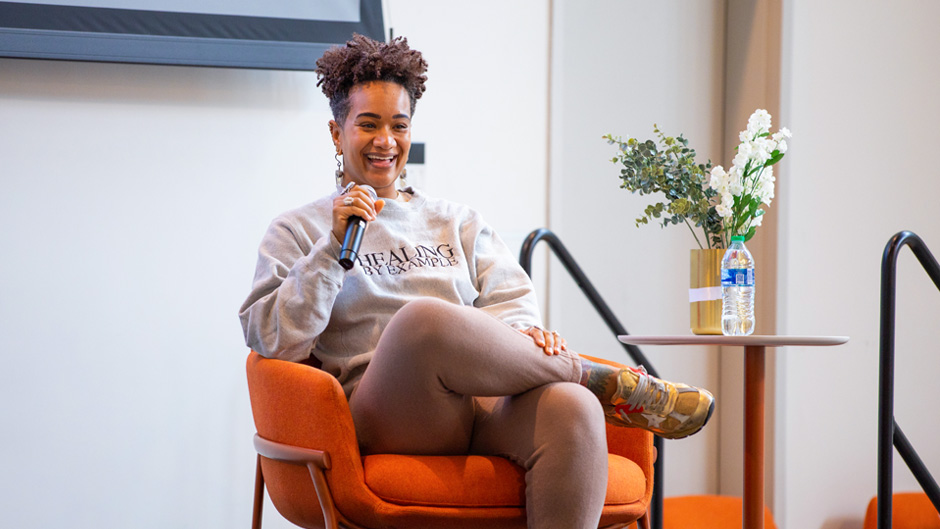At a young age, Alex Elle sought a creative outlet to spark her healing journey. She turned to writing as a vehicle for maintaining mental wellness and practicing well-being.
Elle, a New York Times bestselling author, certified breathwork coach, and restorative writing teacher, shared her path to healing her inner child with more than 200 students and faculty and staff members during a keynote address at the Office of Multicultural Student Affairs’ annual Students of Color Symposium (SOCS) on Saturday.
“I’m a big believer that healing is an act of community care. We break cycles by choosing to heal ourselves, even if we’re the only one in our lineage doing it,” Elle said. “What I think is so beautiful about this room of folks is that it seems as though you all are choosing to be here and choosing to lead and heal by example.”
This year’s event, which took place at the Lakeside Village Expo Hall from 9 a.m. to 4 p.m. on Saturday, centered on the theme, “I Choose Me: Mental Health is Mental Wealth.” The day provided students with a variety of workshops, facilitated conversations, and networking opportunities aimed at destigmatizing mental health and promoting emotional and physical well-being.
As a restorative writer and author of “How We Heal: Uncover Your Power and Set Yourself Free,” Elle’s work focuses on ways to build community and healing practices through the use of literature and language. She advised attendees to explore creative outlets and passions as a tool to embark on their own healing journey.
“Get curious about what lights you up, what makes you feel grounded, and what makes you feel seen, safe, or supported. For me, that was writing,” she said.
The keynote discussion was moderated by Cassandra Michel, the executive chair of SOCS, and Merissa Yancey, a graduate assistant at the Office of Multicultural Student Affairs and senior program coordinator at the School of Law. Audience members had the opportunity to ask Elle questions about navigating protecting their mental health in the workplace or classroom, and how to manage their wellness in the age of social media.

“If [social media] is not supporting you, honor your own boundaries. Be mindful of who you follow. Unfollow people and log off [of social media] and let that be okay,” she said.
Elle also highlighted that inner healing is a lifelong journey and not always linear.
“As we heal, we are going to backtrack. It’s not just a moment of, ‘Okay, I have arrived.’ We are students of life. [Healing] is a forever thing, it’s a forever love,” she said.
SOCS provides an annual opportunity for students to engage in dialogues on topics that affect their educational, personal, and professional growth and aims to develop a students’ understanding of diversity, multiculturalism, ethical leadership, and social responsibility.
Prior to the keynote address, attendees heard from a panel of University experts, including Eric Goldstein, sports psychologist for University of Miami Athletics; Jacqueline Yi, doctoral intern at the Counseling Center; Britney Clarke, alumna and manager, Primo Relations, Bacardi; and Dr. Stephon Martin, a wellness specialist with the Jackson Health System.
The conversation was moderated by Isaiah Frazier, a junior studying business, and Michael Redding, a junior and student-athlete studying psychology. The students asked panelists questions about their different areas of work, mental health, and how it intersects with racial and ethnic identities.
During the morning sessions, attendees participated in herbal sensory stimulation technique lessons with Laura Hasbun, an herbalist and founder of Maracuya Botanicals, and an interactive activity to explore their different identities, facilitated by peer educators from Counseling Outreach Peer Education (COPE).
“It was such a valuable learning experience to hear other students of color share their experiences with mental health and to learn specifically about how their sociocultural identities have shaped their own relationship with mental health,” said peer educator Anisha Bhandari, a senior studying neuroscience.
Stephanie Nuñez, assistant director of the Office of Multicultural Student Affairs, noted that the symposium was made possible by several campus and community partners to make the day success.
“We intentionally invested in collaborating with our campus and community partners to provide mental health and well-being guidance during the planning process. The willingness to collaborate on this timely theme topic has exceeded my expectations and models what this is all about—creating spaces for community,” said Nuñez.
Zoe Major, a sophomore studying political science, describes her SOCS experience as eye-opening. Major served as part of the SOCS planning committee.
“Mental health in communities of color is considered a taboo topic, but through the honestly from the panelists about their own experiences with mental health and the activities set up to engage in discussions that allowed all who attended to be vulnerable, we were all to create a place built upon trust, friendship, and respect,” she said.
To close her remarks, Elle reminded the audience to persist through resistance to find healing and success.
“Don’t let anybody tell you that you can’t. I spent a lot of my life living in the shadows of other people’s fear and projections. It wasn’t until I started leaning into my truth, purpose, and vision that I was really able to see that I can create the light, the glory, and the wonder in my life,” she said.

